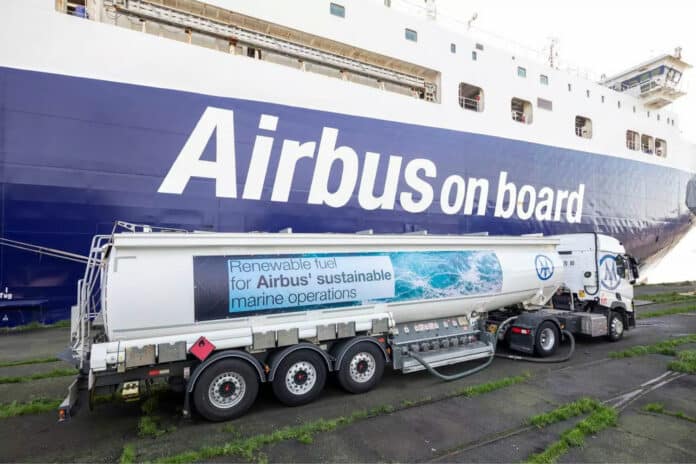Aviation and maritime transportation are unanimously considered the most difficult mobility sectors to decarbonize. In an effort to reduce the impact of its industrial activities on the environment, Airbus is continuously introducing alternative energy solutions across the different transportation methods it uses air, road, and maritime.
In addition to being involved in research related to brand-new all-electric or hydrogen-fueled aircraft, the European multinational aerospace corporation is also giving adequate attention to sustainable fuel – which is believed to be the best solution right now for aviation and shipping.
At the end of December 2022, Airbus launched its first test campaign to explore the use of renewable fuel for its fleet of vessels over the course of 18 months. Provided by Finnish oil refining company Neste and produced in Rotterdam, the renewable diesel fuel is made of HVO (Hydrotreated Vegetable Oil or residual cooking oil), which contains no fossil fuels or additives.
HVO is a paraffinic bio-based liquid fuel originating from many kinds of vegetable oils, such as rapeseed, sunflower, soybean, and palm oil, as well as animal fats. It can be used both pure and blended in any ratio with, e.g., fossil diesel.
The fuel will be used for the first time on the Airbus vessel ‘Ciudad de Cadiz,’ which transports aircraft components from the A320 family from one European production site to another. The 126-meter-long Ciudad de Cadiz is a roll-on/roll-off (RoRo) ship built in 2009 and is currently sailing under the flag of France. It is operated by LDA (Louis Dreyfus Armateurs) on the route Saint-Nazaire-Tunis-Naples-Saint-Nazaire.
During the 18-month test campaign, around a third of the total fuel (around 330 tons) is expected to be renewable, while the rest will be covered by conventional maritime fuel. According to the company, this will reduce CO2 emissions by up to 20% per trip compared to fossil fuel. In one year, on this route only, Airbus aims to save around 6,000 tons of CO2.
This test campaign will enable Airbus and its partners to evaluate the performance of the renewable fuel and the vessel’s engine and confirm how much it has been able to reduce its CO2 emissions.
